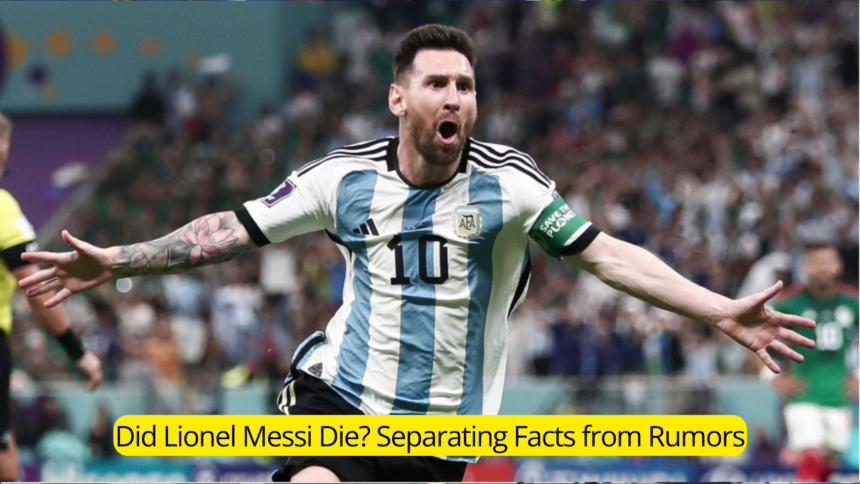Have you recently stumbled upon shocking news claiming that Lionel Messi has passed away? If so, you’re not alone. This alarming rumor has spread like wildfire across social media, leaving many fans worried and confused. Let’s dive into the truth behind this rumor and why such hoaxes gain momentum so easily.
Who is Lionel Messi?
Lionel Messi is more than just a football player; he’s an icon, revered by millions worldwide. Born in Rosario, Argentina, he started his football journey at a young age, showing a rare talent that would eventually lead him to become one of the most celebrated athletes in history. With countless awards and titles under his belt, including seven Ballon d’Or trophies, Messi’s influence on football and sports culture worldwide is unmatched.
The Rumor Mill: How Did the Death Hoax Start?
In recent years, rumors about the deaths of public figures have become common on the internet. A single tweet or a Facebook post can spark a rumor that spirals out of control. The recent claim about Messi’s death began similarly, with a few tweets or posts that quickly gained traction, as people shared the shocking “news” without checking its credibility.
Social Media’s Role in Spreading Fake News
Platforms like Twitter, Facebook, and Instagram have made it easy for information—both true and false—to spread rapidly. When a big name like Messi’s is involved, people share posts almost impulsively, making the rumor spread faster. Unfortunately, the platforms aren’t always quick to address or contain misinformation, allowing rumors to reach large audiences.
Debunking the Death Hoax
To set the record straight: Lionel Messi is alive. Representatives from Messi’s team, credible sports news outlets, and even official statements have clarified that Messi is well and continuing his career. Many fans, upon seeing these statements, began sharing the truth to counteract the misinformation, which helped curb the rumor.
The Impact of Celebrity Death Hoaxes
False reports of a celebrity’s death can cause emotional distress for fans, especially those deeply connected to their idol. When a rumor like this circulates, it also impacts the families and loved ones of the celebrities, who must face unnecessary anxiety.
Why People Believe Death Hoaxes
Death hoaxes often exploit the natural human tendency to respond strongly to negative news. This phenomenon, known as confirmation bias, can make people believe unverified rumors if they align with sensational or shocking expectations. It’s easy to see why a message saying “Messi is dead” could grip someone emotionally, leading them to react without confirming the facts.
Recent Examples of Celebrity Death Hoaxes
Lionel Messi isn’t the first celebrity to face a death rumor. Many high-profile figures, including Jackie Chan, Sylvester Stallone, and even Justin Bieber, have been subjects of similar hoaxes. Each instance has shown how vulnerable public figures are to false reports, with their fans left in suspense until the truth is confirmed.
The Role of News Agencies in Stopping False Information
Trusted news sources play a vital role in combating misinformation. When rumors surface, these agencies quickly debunk false claims, ensuring that their readers get the correct information. In Messi’s case, reputable sports outlets and mainstream media confirmed that he was alive, calming concerned fans worldwide.
Lionel Messi’s Response to the Rumor
Although Lionel Messi himself has not publicly commented on the death hoax, his actions speak louder. Continuing with his commitments and appearances, Messi has shown resilience against such baseless claims. His focus remains on his career and family, choosing to let the truth speak for itself.
Lessons Learned from This Incident
The key takeaway from this incident is the importance of verifying information before sharing it. Hoaxes like this one highlight the need for critical thinking and media literacy in the digital age.
Tips for Spotting Fake News
Not sure if a news story is true? Here are some tips:
- Check the Source: Look for reputable news outlets covering the story.
- Cross-Verify: See if multiple credible sources are reporting the same information.
- Look for Quotes: Official statements from representatives or family members can help confirm or debunk a claim.
- Trust Your Instincts: If it seems unlikely, take a moment to research before sharing.
The Resilience of Lionel Messi
Throughout his career, Messi has faced challenges, from injury setbacks to intense media scrutiny. Yet, he has continued to shine, demonstrating unwavering commitment and resilience. Despite rumors or criticism, Messi remains a powerhouse in football and a respected global figure.
The Importance of Responsible Sharing on Social Media
When you come across shocking news, take a moment before you hit “share.” Being responsible about what we post helps prevent the spread of misinformation. By taking a few seconds to verify information, you contribute to a more informed and balanced digital space.
Conclusion
To summarize, Lionel Messi is alive, and the rumors about his death are just another internet hoax. This incident underscores the importance of checking sources and being cautious about what we believe and share online. Let’s focus on celebrating Messi’s continued journey rather than letting fake news distract us.
FAQs
Q1: How did the rumor about Messi’s death start?
A: It began with unverified social media posts that quickly gained traction.
Q2: Has Lionel Messi responded to the death hoax?
A: Messi has not directly addressed the hoax, but his continued public appearances indicate the truth.
Q3: Why do people believe in death hoaxes?
A: Psychological factors like confirmation bias make people prone to believing shocking, negative news.
Q4: How can I avoid falling for fake news?
A: Verify sources, cross-check with reputable news outlets, and avoid sharing unverified information.
Q5: Who are other celebrities who have faced death hoaxes?
A: Celebrities like Sylvester Stallone, Jackie Chan, and Justin Bieber have all faced similar hoaxes.

